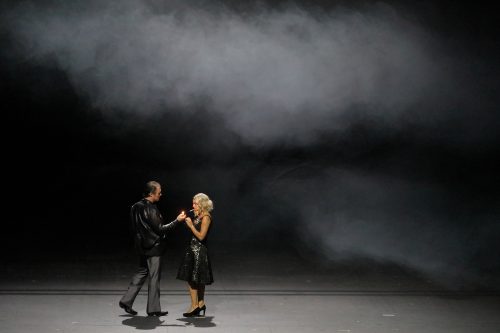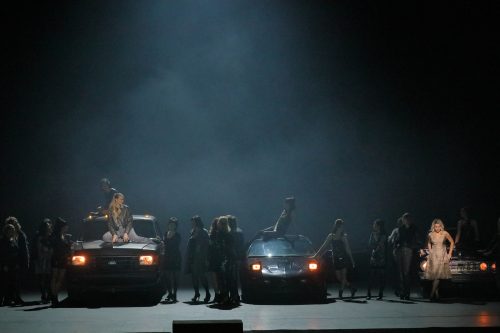Germany Tchaikovsky, Pique Dame: Soloists, Choir and Orchestra des Bayerisches Staatsoper / Aziz Shokhakimov (conductor), Nationaltheater, Munich, 9.2.2024. (ALL)

Production:
Production – Benedict Andrews
Set designer – Rufus Didwiszus
Costume designer – Victoria Behr
Lighting designer – Jon Clark
Choreography – Klevis Elmazaj
Dramaturgy – Olaf Roth
Chorus master – Christoph Heil
Cast:
Hermann – Brandon Jovanovich
Count Tomsky – Roman Burdenko
Yeletsky – Boris Pinkhasovich
Chekalinsky – David Alegret
Surin – Bálint Szabó
Chaplitsky – Kevin Conners
Master of Ceremonies – Aleksey Kurzanov
Countess – Violeta Urmana
Lisa – Asmik Grigorian
Polina – Victoria Karkacheva
Governess – Natalie Lewis
Masha – Daria Proszek
Narumov – Nikita Volkov
Boy-Commander – Amalia Steinmetzer
After Benedict Andrews’s insightful production of Così fan tutte (review here) last year, expectations were high for this new staging of Tchaikovsky’s Pique Dame with a strong cast. However, this minimalist production turned out to be surprisingly underwhelming.
The stage is dimly lit, shrouded in smoke, and sparsely furnished, set in modern surroundings. Costumes, which typically serve to highlight the social differences among characters, are uniformly grey and dark. Each scene begins with a large-scale close-up video, predominantly featuring Lisa, occasionally Hermann, and ultimately a triumphant and assertive Countess.

Settings are arbitrary with characters singing and dancing on top of cars or even worse, chorus and singers sitting on benches and hardly moving during the crowd scene. Regrettably, there is little to no Personenregie, resulting in a lack of character development. The only notable concept emerges at the conclusion, where the chorus, all dressed identically to the Countess, symbolises Hermann’s descent into madness. However, this idea arrives too late in the performance to salvage the production.
This disappointment is compounded by the fact that, apart from one performer, the cast is strong. Brandon Jovanovich’s portrayal of Hermann fell short, despite his familiarity with the role which he sang under Mariss Janssons in Salzburg. While he improved in the third act, he struggled with the tessitura and phrasing earlier in the performance.
All eyes were on Asmik Grigorian. She did not disappointed with genuine stage presence and dramatic intensity particularly in the last duet with Hermann, probably the highlight of the opera. But one could not feel that this production robbed her of what could have been a truly great performance.
As always, Yeletsky stole the show with his Act II aria wonderfully sang by Boris Pinkhasovich. Victoria Karkacheva’s Polina had golden tones and great phrasing. Violetta Urmana made a lot of the role of the Countess. Smaller roles – since we are in Munich after all – were superb and well-cast.
Under Aziz Shokhakimov’s direction, the orchestra performed efficiently, though occasionally too loudly. The chorus delivered a powerful performance.
Given these circumstances, one might question whether such a work would be better suited for a concert performance. I have had this experience three times, and each was unforgettable. One memorable occasion was with a renowned conductor whose name I do not even want to write as his legacy is forever tarnished by his association with Putin. Another was last year in Berlin under Kirill Petrenko. However, the most memorable was 33 years ago at the Symphony Hall in Boston, featuring beloved artists such as Mirella Freni, Maureen Forrester, and Dmitri Hvorostovsky, with Vladimir Atlantov as Hermann. The orchestra was exceptional, under the baton of Seiji Ozawa, whose recent passing has been a profound loss to the music world.
Antoine Lévy-Leboyer